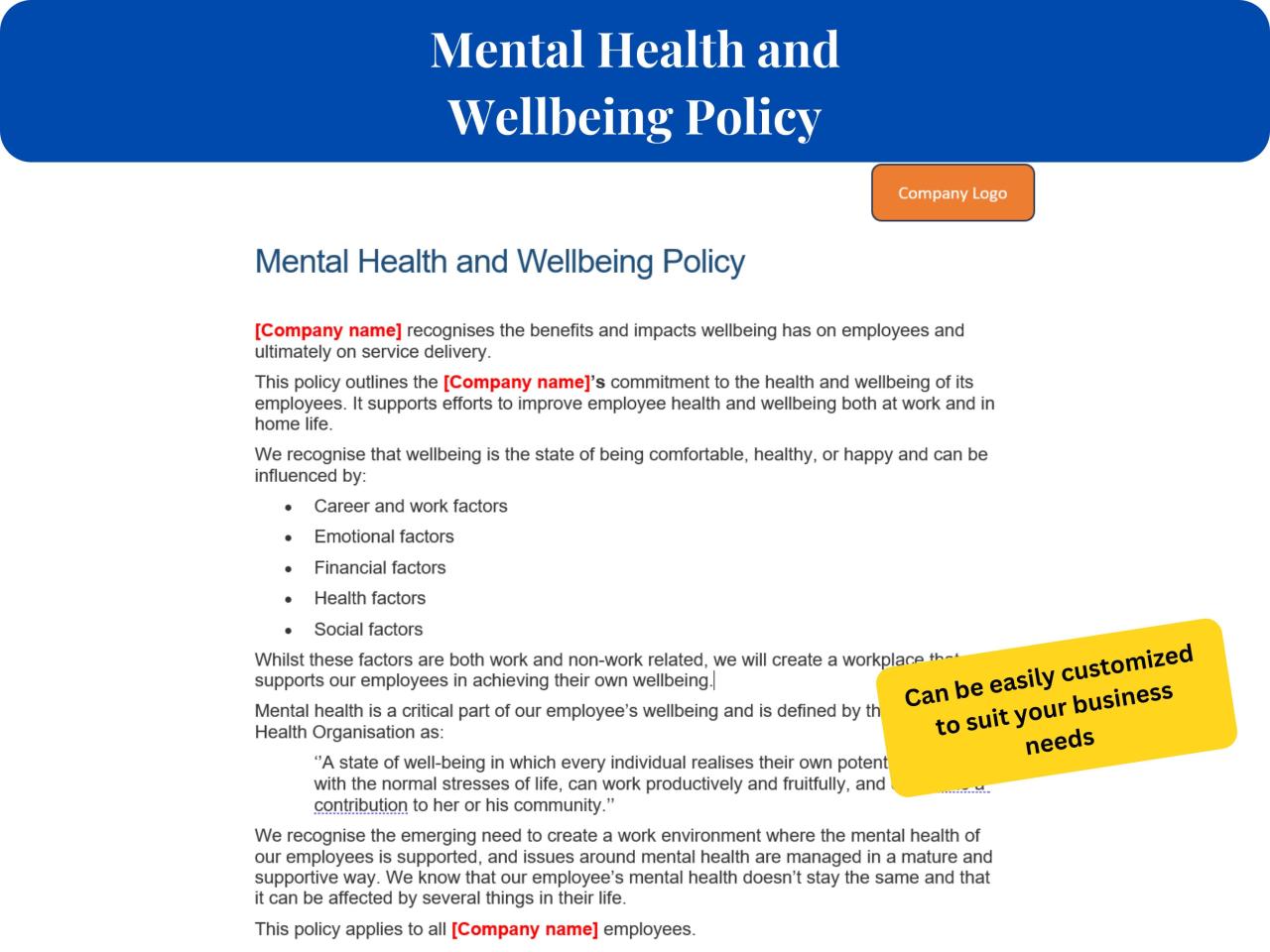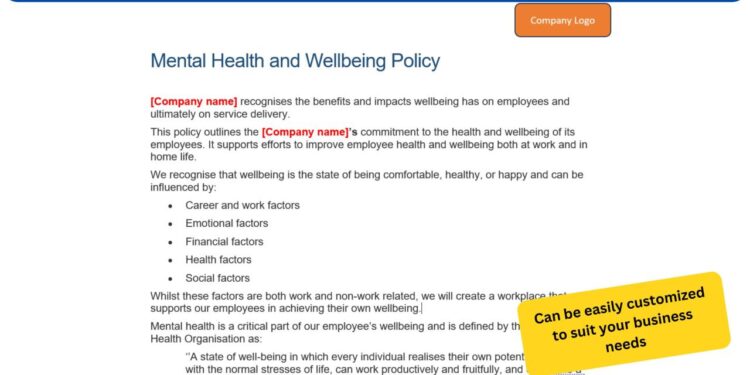Corporate Policies Supporting Mental Health Days sets the stage for this enthralling narrative, offering readers a glimpse into a story that is rich in detail and brimming with originality. It explores the importance of mental health days in the workplace and how they can benefit both employees and the company.
As we delve deeper, we will uncover key components of effective corporate mental health policies, strategies for creating a supportive work environment, and ways to measure the impact of these policies.
Importance of Corporate Policies Supporting Mental Health Days
Mental health days play a crucial role in the overall well-being of employees in the workplace. These policies are designed to provide individuals with the necessary time off to address their mental health needs, reducing stress and burnout.
Benefits of Mental Health Days
- Improved Employee Morale: Taking mental health days allows employees to recharge and come back to work feeling refreshed and motivated.
- Increased Productivity: By prioritizing mental health, employees are better equipped to focus on their tasks and perform at their best.
- Reduced Absenteeism: Addressing mental health concerns proactively can help prevent prolonged absences due to burnout or mental health issues.
Impact on Employee Well-being and Productivity
Corporate policies supporting mental health days have a positive impact on employee well-being by fostering a culture of care and understanding. When employees feel supported in managing their mental health, they are more likely to be engaged and productive in their roles.
Components of Effective Corporate Mental Health Policies

Effective corporate mental health policies are crucial in creating a supportive work environment that prioritizes the well-being of employees. These policies should encompass various key elements to ensure their effectiveness in promoting mental health and providing necessary support to employees facing mental health challenges.
Key Elements of Corporate Mental Health Policies
- Clear communication: Policies should clearly Artikel the procedures for requesting mental health days and the support available to employees.
- Flexible work arrangements: Providing options like remote work, flexible hours, or compressed work weeks can help employees manage their mental health effectively.
- Training and education: Offering mental health training to managers and employees can help reduce stigma and increase awareness about mental health issues.
- Access to resources: Employees should have access to mental health resources such as counseling services, employee assistance programs, and mental health hotlines.
- Non-discrimination: Policies should ensure that employees feel safe and supported when discussing mental health issues without fear of discrimination or retaliation.
Approaches to Implementing Mental Health Policies
- Top-down approach: Management takes the lead in promoting mental health initiatives and policies throughout the organization.
- Collaborative approach: Involving employees in the development and implementation of mental health policies can lead to better acceptance and adherence.
- Customized approach: Tailoring policies to the specific needs and challenges of the workforce can increase their effectiveness and relevance.
Role of Management in Promoting and Enforcing Policies
- Setting the tone: Management plays a crucial role in creating a supportive culture that values mental health and encourages employees to prioritize self-care.
- Providing resources: Management should ensure that employees have access to the necessary resources and support needed to maintain good mental health.
- Leading by example: By openly discussing mental health and utilizing available resources, managers can set a positive example for their teams.
Strategies for Creating a Supportive Work Environment

Creating a work environment that supports employees' mental health is crucial for their well-being and overall productivity. By fostering a culture that encourages the use of mental health days, companies can significantly improve the mental well-being of their employees.
Fostering a Culture of Mental Health Support
- Offering mental health training for managers and employees to recognize signs of mental distress and provide support.
- Implementing flexible work hours or remote work options to help employees manage their workload and personal responsibilities.
- Organizing wellness programs and activities such as yoga classes, meditation sessions, or mental health workshops.
- Providing access to mental health resources such as counseling services, therapy sessions, or employee assistance programs.
Importance of Open Communication and Destigmatizing Mental Health
- Encouraging open communication about mental health issues in the workplace to create a supportive and understanding environment.
- Normalizing conversations around mental health and promoting awareness to reduce stigma and discrimination.
- Training managers and HR personnel on how to address mental health concerns sensitively and confidentially.
- Establishing support groups or employee resource networks where individuals can share experiences and seek help.
Measuring the Impact of Corporate Mental Health Policies

Assessing the effectiveness of corporate mental health policies is crucial to ensure the well-being of employees and the overall success of the organization.
Assessing Effectiveness of Mental Health Policies
- Conduct regular surveys or feedback sessions to gather employee input on the impact of mental health days and policies on their well-being.
- Monitor absenteeism rates to see if there is a decrease in unplanned absences after the implementation of mental health policies.
- Track employee engagement levels and job satisfaction to gauge the overall impact of the policies on workplace morale.
Metrics for Tracking Impact
- Employee satisfaction surveys
- Performance evaluations before and after policy implementation
- Number of mental health days taken by employees
- Retention rates and turnover data
Successful Implementation Examples
Companies like Google and Microsoft have successfully implemented mental health policies that prioritize employee well-being. These organizations offer mental health days, access to mental health resources, and promote a culture of open communication around mental health issues.
Wrap-Up
In conclusion, Corporate Policies Supporting Mental Health Days play a crucial role in fostering a positive work culture and enhancing employee well-being. By implementing these policies effectively, companies can create a supportive environment that values mental health and ultimately boosts productivity.











